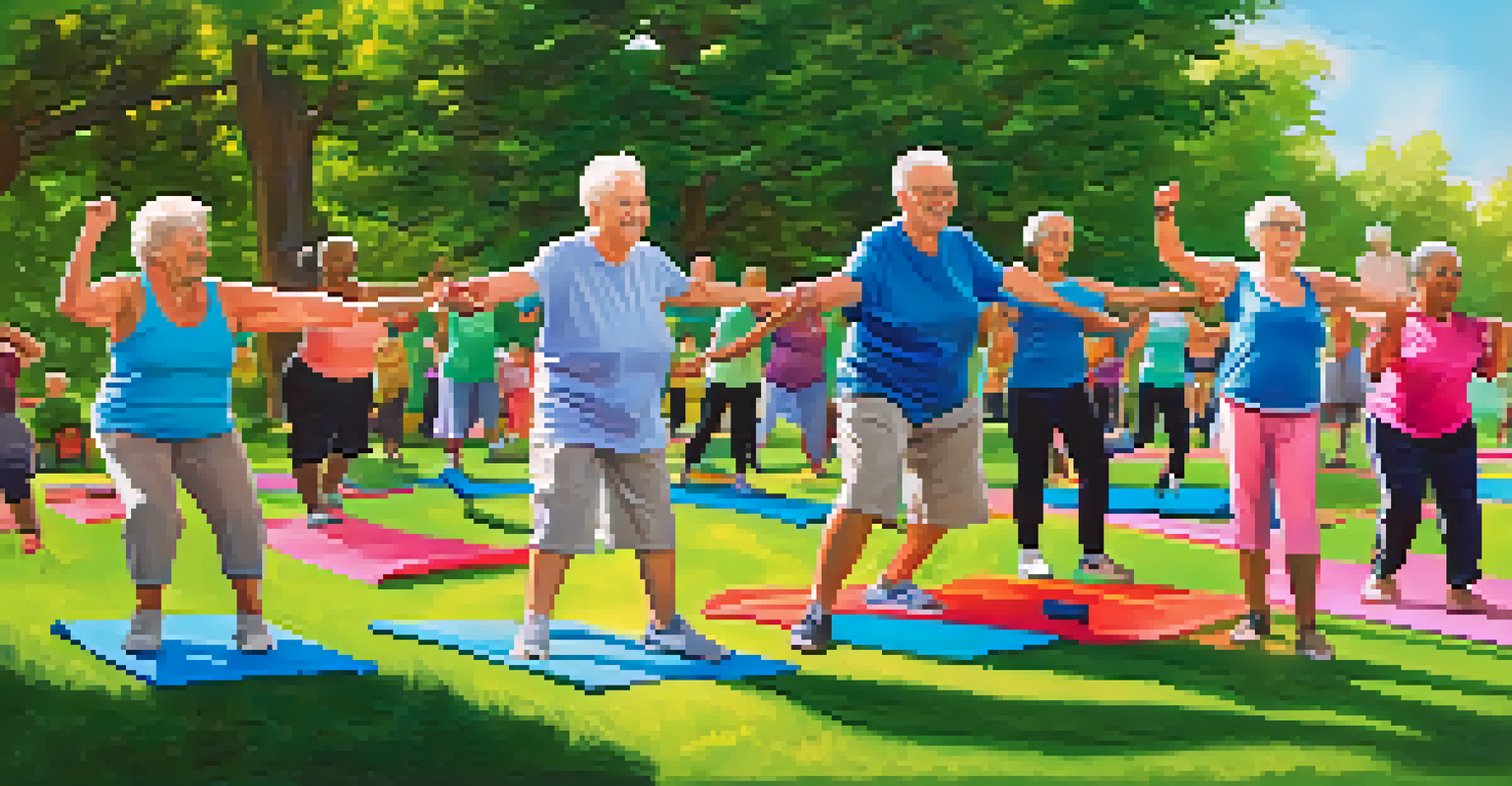Creating a Balanced Fitness Regimen for Seniors

Understanding the Importance of Fitness for Seniors
As we age, staying active becomes crucial for maintaining our health. Regular exercise can help manage weight, improve heart health, and boost mood. It's not just about looking good; it's about feeling good and ensuring independence as we grow older.
The secret of change is to focus all of your energy not on fighting the old, but on building the new.
Moreover, fitness plays a vital role in enhancing mobility and flexibility. This can significantly reduce the risk of falls, a common concern for seniors. Incorporating balanced activities helps keep our bodies agile and our minds sharp.
Ultimately, a well-rounded fitness regimen can lead to a longer, healthier life. Think of it as investing in your future well-being. The right approach to fitness can empower seniors to live life to the fullest.
Consulting a Healthcare Professional Before Starting
Before diving into any new fitness program, it's essential to consult with a healthcare professional. They can assess your current health status and recommend the best course of action tailored to your individual needs. This step is especially important if you have preexisting conditions.

Having a clear understanding of your limits can prevent injuries and ensure a safer exercise experience. For instance, if you have joint issues, a doctor may suggest low-impact exercises like swimming or cycling. This personalized approach makes all the difference.
Fitness Enhances Senior Well-being
Regular exercise is essential for seniors to maintain health, improve mobility, and enhance overall quality of life.
Additionally, a healthcare professional can help you set realistic fitness goals. Instead of aiming for an unrealistic transformation, focus on achievable milestones that foster a sense of accomplishment and motivation.
Incorporating Strength Training into Your Routine
Strength training is often overlooked but is vital for seniors. It helps build and maintain muscle mass, which naturally decreases with age. Think of your muscles as the body's support system; stronger muscles can lead to better balance and stability.
Take care of your body. It's the only place you have to live.
You don't need to lift heavy weights to gain benefits. Simple resistance exercises using bands, light weights, or even body weight can be effective. For example, squats and wall push-ups are great exercises to start with, and they can be done at home.
Aim for at least two days a week of strength training, focusing on major muscle groups. Remember, consistency is key! This type of training can lead to improved everyday activities, making tasks like climbing stairs or lifting groceries much easier.
The Role of Cardiovascular Exercise in Overall Health
Cardiovascular exercise is just as important as strength training. Activities like walking, swimming, or cycling get your heart pumping and improve circulation. This type of exercise helps lower the risk of heart disease, which is a leading concern for seniors.
Engaging in at least 150 minutes of moderate-intensity cardio each week can make a significant difference. You can break this down into smaller sessions if that feels more manageable. For example, a brisk 30-minute walk five times a week can do wonders.
Consult Before Starting a Program
It's crucial to consult a healthcare professional before beginning any new fitness regimen to ensure safety and effectiveness.
Finding an enjoyable activity can turn cardio into a fun part of your day. Whether it's dancing, gardening, or group classes, the key is to keep your heart healthy while enjoying the process.
Don't Forget About Flexibility and Balance Exercises
Flexibility and balance exercises are essential components of a balanced fitness regimen. They help maintain your range of motion and prevent stiffness in the joints. Simple stretching routines can improve posture and relieve tension in your body.
Balance exercises, such as tai chi or standing on one leg, are crucial for preventing falls. These activities train your body to maintain stability and coordination, which can diminish over time. Even practicing standing from a seated position can enhance balance.
Incorporating these exercises at least two to three times a week can make a noticeable difference. Think of them as the icing on the cake; they complete your fitness routine and support your overall wellness.
Listening to Your Body: Rest and Recovery
One of the most important aspects of fitness, especially for seniors, is listening to your body. It's normal to feel some soreness after a workout, but sharp pain or discomfort is a sign to slow down. Rest and recovery are just as vital as the workouts themselves.
Make sure to include rest days in your regimen, allowing your muscles to recover and rebuild. This is essential for preventing injuries and burnout. For instance, if you’ve had an intense workout, consider doing something gentle like yoga the next day.
Incorporate Strength and Cardio
A balanced routine that includes both strength training and cardiovascular exercise is vital for improving physical health and preventing falls.
Moreover, adequate sleep and nutrition play critical roles in your recovery process. Prioritizing rest will help you feel energized and ready to tackle your workouts with enthusiasm.
Staying Motivated and Setting Realistic Goals
Staying motivated can sometimes be a challenge, but setting realistic goals helps keep your spirits high. Instead of aiming for an extreme transformation, focus on small, achievable milestones. Celebrate these victories to boost your confidence and motivation.
Consider joining a group class or finding a workout buddy. Exercising with others can make fitness more enjoyable and creates a support network. Plus, it fosters accountability, which can help you stay on track with your routine.

Lastly, remember that fitness is a journey, not a destination. Be patient with yourself, and don't hesitate to adapt your regimen as needed. Enjoying the process will lead to lasting habits that contribute to your overall well-being.
Embracing a Holistic Approach to Fitness
Creating a balanced fitness regimen goes beyond physical activity; it encompasses a holistic approach to well-being. This means paying attention to mental health, nutrition, and social connections. Together, these elements create a supportive environment for a healthy lifestyle.
Incorporate mindfulness practices, such as meditation or deep breathing, into your routine. These techniques can reduce stress and enhance your overall mental health. Feeling good mentally can motivate you to stay active physically.
Additionally, maintaining a balanced diet is crucial for fueling your body. Focus on consuming whole foods and plenty of fruits and vegetables. By nourishing your body, you're not just optimizing your fitness routine, but also promoting longevity.